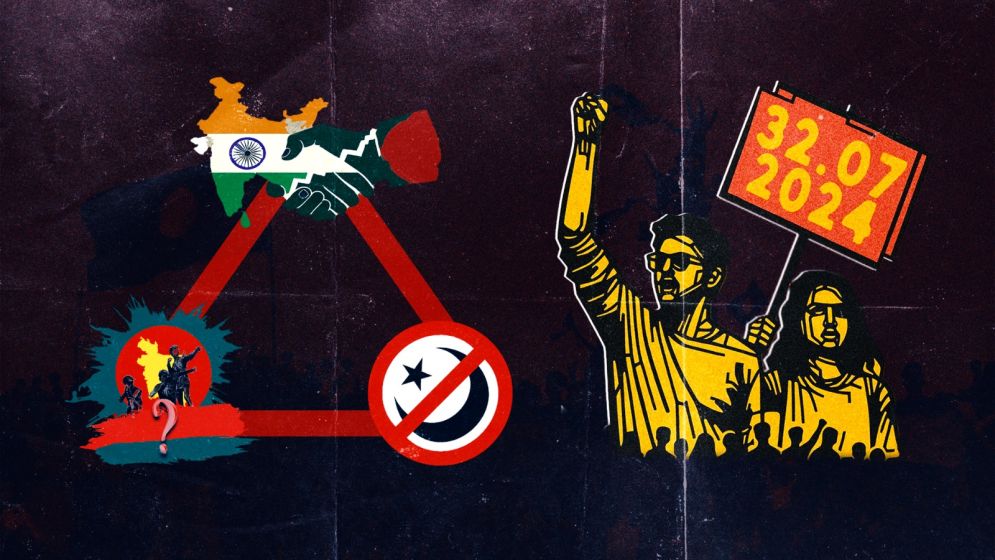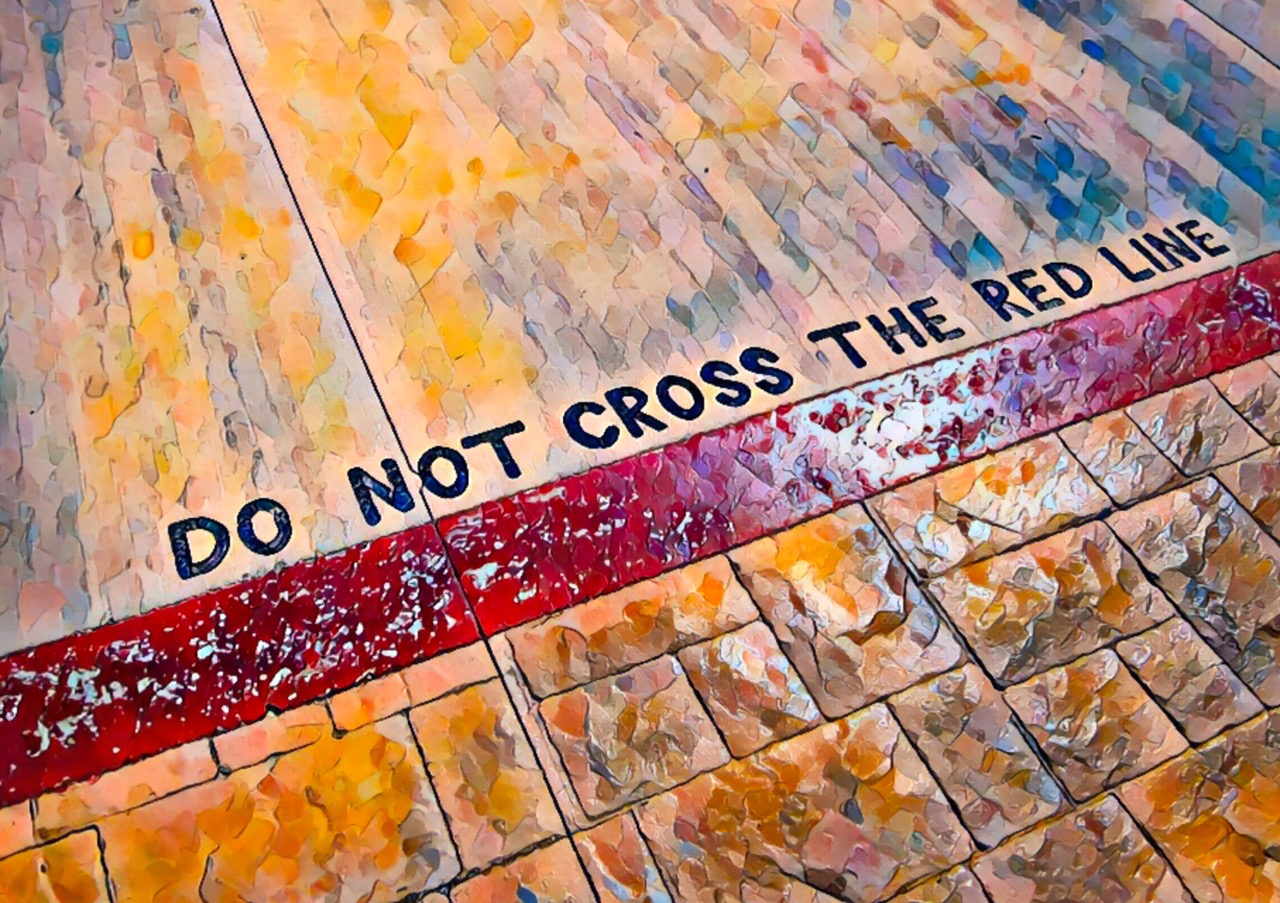The invisible triangle shaping Bangladesh's political landscape…

The unforgiving rules of Bangladeshi politics can be visualized as a restrictive triangle.
If you wish to play the game of party politics in this country, let alone hope to hold power, you must remain inside this triangle. Its three sides are not negotiable. Cross any one, and you are out.
First: you cannot be seen as anti-Muslim.
Second: you cannot appear pro-Indian.
Third: you must never question the sanctity of 1971– the Liberation War that forged the nation.
These red lines are not written into law, but they are etched deep into the political psyche. They shape campaign rhetoric, dictate alliances, and silently disqualify anyone who drifts too far from the national consensus– or, more accurately, from the emotionally charged perceptions that stand in for it.
Ask an Awami League supporter about the BNP or Jamaat-e-Islami, and they’ll likely sneer that these are not truly Muslim parties– that their piety is a mask for corruption.
But flip the conversation, and Islamists or BNP loyalists will insist the Awami League has sold out Muslim identity altogether. Within this triangle, perception is everything.
Even the newly formed NCP, about whom no one quite knows what they stand for, is quietly granted a pass– if only because no one accuses them of being anti-Muslim.
Then comes India– the perpetual specter in Bangladeshi political consciousness. A deep current of anti-India sentiment has shaped the country’s identity since before 1971.
This sentiment doesn’t need to be explicit, but it must be felt. You may survive without posturing against India– but you cannot openly embrace it. To be seen as pro-Indian, like the Awami League was and is, is to walk a dangerous tightrope over a pit of nationalist suspicion.
The third red line is 1971– and it is sacrosanct. To be clear, there is not one single version of 1971. The Awami League’s 1971 is not the BNP’s, and neither quite matches the version imagined by the rising NCP.
But whatever the differences in emphasis or ownership, there is an unspoken consensus: no mainstream political actor dares to question the fundamental legitimacy of the Liberation War.
You can argue over the heroes. You can rewrite the footnotes. But you cannot say that the war itself was a mistake, or that the country should have remained part of Pakistan.
That is a red line that no serious party
crosses– not because the state forbids it, but because society won't tolerate
it.
Why crossing a red line is dangerous?
So, now here is my theory: political survival in Bangladesh depends on staying within these three lines that form an invisible triangle. If you want to matter– if you want to build coalitions, mobilize supporters, or win elections–you have to exist within this triangle of permissible identity.
The Awami League, ironically, has found itself increasingly cornered, having drifted too close to being seen as both anti-Muslim and pro-Indian. Jamaat-e-Islami, despite decades of maneuvering, has failed to re-enter the mainstream–its sin was crossing one line [of 71] too many.
This is because these lines are not just political taboos. They are the architecture of national common sense. They reflect the boundaries of what the average Bangladeshi, across class and region, is willing to accept.
And that is precisely why crossing even one of them is so costly. It fractures your potential base. It creates too many enemies and alienates too many allies. In a country where political success depends on forging a multi-class, multi-regional support base, crossing a red line means you’ve forfeited that possibility.
But something curious is happening now. A new red line may be forming– an implicit one, still emerging, not yet fully drawn. Call it the line of 2024.
A quiet consensus seems to be building: you cannot question 2024 too harshly. You cannot position yourself as fundamentally anti-2024 and still hope to be seen as a viable political force.
It is too soon to say whether this will harden into a fourth side of the triangle–whether it will calcify into a new rule of political engagement. But if that happens, if this triangle becomes a quadrilateral, then the real winner may be the NCP.
Because it is their cautious, calibrated tightrope walk that best aligns with this emerging shape.
And perhaps that is the new game in
Bangladesh– not to redraw the lines, but to preemptively learn how to walk
them.-68087e0a9ce95.png)
Who’s playing what?
Jamaat-e-Islami, long exiled from the political mainstream, probably has a different idea: not to step back inside the triangle, but to redraw it. Their gambit is clear– they want to replace the anti-1971 red line with a new one: anti-2024.
If they can do that, the stain of their historical opposition to Bangladesh’s independence could fade into irrelevance, replaced by a more current grievance against the status quo.
The NCP, more subtle in its ambitions, seeks not to erase any red line but to add a fourth–transforming the iron triangle into a quadrilateral. In their vision, anti-2024 becomes just as untouchable as anti-Muslim, pro-Indian, or anti-1971 stances already are.
The BNP, for its part, has no such strategic aspirations. It doesn't want to rewrite the rules of engagement. But it has made one thing clear: it will not permit the anti-1971 red line to be erased.
Its stake in the triangle is defensive, not transformative. Ironically, though, the red line most often used to tarnish the BNP isn’t 1971– it’s India.
The party is frequently accused of being “pro-Indian,” a charge that is both false and politically devastating. In the court of public opinion, this single accusation can undermine decades of ideological work.
Here’s the harder truth: if Jamaat wants to return to power, it must convince a majority– not a fringe– that 1971 no longer matters. Either 50 to 70 percent of Bangladeshis must stop caring about the war, or a similar number must come to believe that Jamaat was never really against it.
One is revisionism. The other is reinvention. Both are difficult. But without achieving either, Jamaat remains outside the frame.
And so the triangle holds– for now. If you want to be electorally relevant in Bangladesh, especially in the long run, you stay within it. You don’t challenge its shape. You don’t test its edges.
Because once you cross a red line, you're not just making a political mistake–you’re violating the boundaries of national imagination. You lose the capacity to build coalitions, to speak across classes, to be taken seriously as a contender for power.
Of course, those with the ambition to redraw the map — to replace one red line or add another–may yet change the game. But until then, all politics in Bangladesh remains triangulated.
—-
Faham Abdus Salam is an Australia-based writer and commentator

